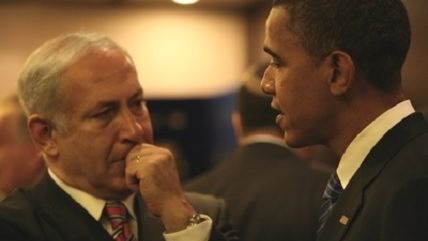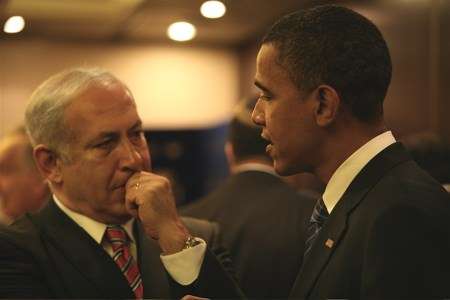Tensions High After White House Official Calls Israeli PM 'Chickenshit'


The rift between the Obama administration and Israel's Prime Minister Benjamin "Bibi" Netanyahu is growing more apparent. And it might be indicative of changing relations between the U.S. and Iran.
On Tuesday The Atlantic published an article titled "The Crisis in U.S.-Israeli Relations Is Officially Here." Well, if it weren't already, it is now. The piece opens with this quote:
The thing about Bibi is, he's a chickenshit.
The colorful opinion comes from a "senior Obama administration official" who remains unnamed. Whoever it was went on to explain:
The good thing about Netanyahu is that he's scared to launch wars. The bad thing about him is that he won't do anything to reach an accommodation with the Palestinians or with the Sunni Arab states. The only thing he's interested in is protecting himself from political defeat. … He's got no guts.
Netanyahu responded on Wednesday:
Our supreme interests, chiefly the security and unity of Jerusalem, are not the main concern of those anonymous officials who attack us and me personally, as the assault on me comes only because I defend the State of Israel. …Despite all of the attacks I suffer, I will continue to defend our country. I will continue to defend the citizens of Israel.
Alistair Baskey, spokesman for the National Security Council, assures that the "chickenshit" comment does not reflect the views of the rest of the Obama administration. However, reports Fox, "administration officials … did not signal there would be any robust effort to find out who said it." Baskey also says that the two nations "do not agree on every issue," pointing out the U.S.'s view that Israel's annexation and settlement of certain territories is illegitimate and counter-productive.
At The Washington Post Daniel Drezner points out that the report coincides with news "on how the United States appears to be tacitly and not-so-tacitly coordinating with Iran across a range of Greater Middle East issues." He speculates:
The one thing this kind of trash-talking does is send a signal to Iran about the U.S. commitment to a nuclear deal. Bear in mind that in recent weeks the administration has made it cleat that it won't be going to Congress to get approval for the permanent lifting of any Iran sanctions. But this raises the question for both Iranian negotiators and Iranian hardliners of just how much they can trust their American interlocutors to implement such a deal. Furthermore, Netanyahu's persistent and bellicose rhetoric towards Tehran would also have to be a source of concern for the Iranians. If they cut a nuclear deal, they want it to be implemented and they want the shadow of military action lifted.
Calling out Netanyahu serves both functions for the Obama administration. The way one signals credibility in a world of uncertainty is to take a costly action. Since congressional approval is now off the table, dissing America's closest ally in the region serves as an imperfect substitute. It's costly, so it sends a signal of serious intent.
In August I highlighted a report from global intelligence and advisory firm Stratfor that indicated the ISIS war could mark a positive change in U.S.-Iran relations.


Show Comments (297)